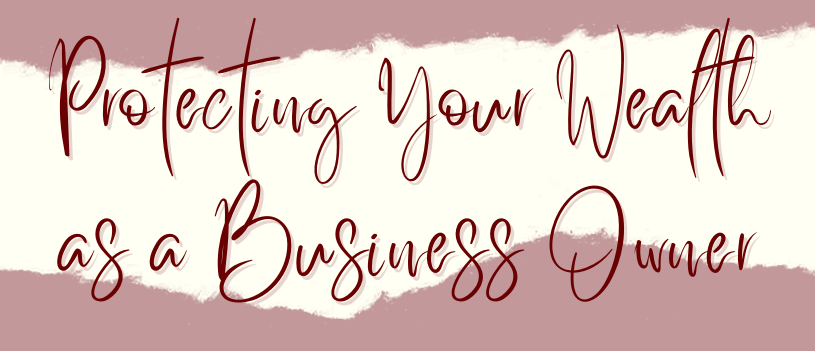There are many uncertainties you can face as a business owner. From hoping your customers will find value in your product to keeping your business staffed, owning a company can be a difficult task. This is especially true for those individuals who have invested their own capital in their business or for those who do not have business insurance.
As business owners, it is important that you take measures to protect yourselves and your personal wealth. Unfortunately, there will always be the possibility that you may get sued or that your business goes under. Although these risks exist, there are four steps owners can take to protect their wealth from the unknown.
1. Set Up the Correct Legal Entity
The first step you can take in protecting yourself from business liabilities is choosing the right legal entity. It is important to note that not all entities provide the best protection. For example, for those who operate as a sole proprietorship, your personal assets can be seized if a lawsuit occurs or if you owe money to creditors. This means that your personal property, home, and investments can easily be used to pay your debts..
One way to avoid this is by creating a limited liability company (LLC) as this will provide certain protections to not only yourself but also your shareholders. For LLCs and corporations, your business’ assets can be used to pay off creditors if you are unable to meet your obligations. The main difference between LLCs and corporations is that profits and losses of a corporation are taxable to the entity and are taxed at the corporate rate. LLCs, on the other hand, do not pay taxes on business income. This is considered a pass-through entity meaning profits and losses of the entity are passed to the shareholders to be taxed.
If you would like to add more protection for yourself, you can also layer different legal structures. For example, if you own a store with available space, you could use this extra room to receive rental income from tenants. You could then set up separate legal entities for your business and for the building ownership. If your renters were to sue you, your company would then not be affected. By setting up a layered structure you are able to put distance between yourself and possible incidents.
2. Get Business Insurance
For every entity you set up, you should have a business insurance policy for each. The first line of defense you should have is a Business Owner’s Policy which offers broad protection against potential claims that could hurt your assets. This type of policy can protect you from injuries that occur on your business’ property, theft, property damage and more. The policy will also cover legal defense costs for your business. Depending on your type of business, you may have to obtain additional insurance that is specific to your line of work in order to provide better protection.
For example, you may need to purchase professional liability insurance which protects you from errors or omissions as well as claims of negligence that could occur due to services you have provided your customers. Overall, it would be beneficial to contact your insurance agent to discuss which products would best fit your needs.
3. Separate Personal and Business Affairs
After setting up your business as an LLC or corporation, it is time to ensure that your company name is used on all documentation such as employment contracts, leases, and supplier agreements. You should also have a separate bank account for your company so that your personal life remains separate. It is also ideal to use a company credit card to help make tracking business expenses an easier task.
As a business owner, you will need to maintain company records in a corporate book. Please note for corporations, a majority of states require that you provide certain documentation such as meeting minutes and annual reports. It is important to check your state and local requirements for legal entities as these do vary by state. It is recommended to reach out to your accountant so that you are prepared for important deadlines so that you do not get penalized or fined.
4. Create a Contingency Plan
When hard times hit your business, it can be stressful as this may impact your personal finances. Instead of being unprepared when uncertainties strike, you should put a plan together to keep your family safe when your business finds itself in a tough spot. It is specifically important to create a contingency plan if your business is your only source of income. If this is you, then you should think of additional revenue streams you can take on to help supplement the income. Another good step to take is to maintain good relationships with your previous employers as you never know when you may need to return to a former position. You should also consider setting aside savings while your business is thriving so that you are prepared for possible bad days. It is important that you also sit down with your family to discuss how you can support one another when your business is going through a difficult time. Lastly, have a discussion with your spouse to see how their salary can support your household when financial pressure strikes.
By following these few steps, you will be more prepared for when disaster strikes your business. Instead of allowing your personal wealth to be negatively affected by the risks of being a small business owner, you will be protected and therefore will have a better future for your business and yourself.
If you need a referral to an insurance agent to discuss your specific needs, reach out to me at 310-534-5577 or [email protected]. I’ll be happy to give you contact information for those I know and trust!
